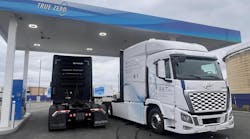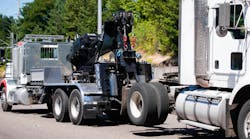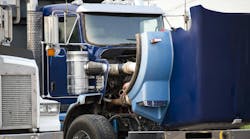Issue: Sound environmental management can help you avoid EPA's new Stormwater Permit Program
The Environmental Protection Agency (EPA) recently published the requirements for Phase II of the Stormwater Program, which picks up where Phase I left off. Under Phase II, smaller municipalities (population under 100,000) must have a stormwater permit. In addition, construction sites as small as one acre are now required to get stormwater permits.
Most truck fleets are covered under Phase I because of their vehicle maintenance and fueling procedures, or because they store materials outdoors. Phase I also mandates that larger municipalities obtain stormwater permits for the discharge coming from storm sewers and sewage treatment plants.
What are the ramifications of Phase II? First of all, small municipalities will be subject to a new and expensive permit program. Although Phase II is designed to be easy to adhere to, many municipalities will not be able to meet the stormwater discharge requirements as determined by the permits. This will undoubtedly force some localities to create and enforce local stormwater permit programs that will apply to companies within their jurisdiction that discharge waste - including truck fleets.
Secondly, with a new minimum size for construction sites that need stormwater permits, any facility that expands or opens new ground for construction will almost certainly have to get a permit.
Changes in local stormwater programs will not happen overnight. Municipalities must apply for their permits by February 2002. After that it will be up to the municipalities to determine how their programs are running and whether or not they should try to regulate any of their upstream dischargers. The same time frame will apply to stormwater permits for small construction sites.
But there is some good news. Phase II contains the "No-Exposure Certification" (NEC) designation, which was established to correct inconsistencies found in the Phase I program. For example, because of the way Phase I rules were written, many fleets fell under the bureaucracy of the stormwater rules even though their maintenance operations were conducted entirely indoors and presented no threat to stormwater.
Under the new guidelines, fleets that are able to demonstrate that run-on and runoff from their facilities are not exposed to industrial activities can apply for NEC status and opt out of the Phase I stormwater permit program for five years. The NEC application is a relatively simple form, with 12 questions about things such as significant spills and leaks, maintenance, outdoor storage, and fueling.
Although everyone won't qualify, a substantial number of fleets should be eligible for NEC status. If you want to increase your chances of getting this certification, review your operations to determine areas that need to be cleaned up or improved. Here are some of the areas you should look at:
Fueling islands. Cover them up so they're protected from rain and snow. If they're situated so that rainwater runs across the island and carries drips and spills away to the storm sewer or open environment, the run-on/runoff will have to be stopped or diverted. Spills, leaks, or residuals from fueling islands can't come in contact with stormwater.
Maintenance. Conduct all maintenance activities indoors, including vehicle washing. Wrecked trucks, which could be leaking, cannot remain uncovered on site, where they might be exposed to precipitation. Exposed engines should also be covered, and all leaking fluids contained. Industrial machinery should be stored and cleaned indoors.
Storage. Parts and materials, batteries, tires, and scrap metals should be moved indoors or protected by awnings or temporary covers until they can be moved or roofed over. Outdoor storage of tanks, drums ,and barrels is allowed as long as the containers are sealed. They must be banded or have lids tightly sealed with no working taps or valves attached. If substances are added or removed from the containers while they are outside, that constitutes "exposure" and mandates a stormwater permit for the facility. All dumpsters must be covered and non-leaking.
Even if your fleet facility is not eligible for NEC status, it's still important to do whatever you can to prevent and minimize waste. It's sound environmental management.
[Ed. Note: Steve Hensley is an environmental specialist at the American Trucking Assns. and manages the Green Truck compliance assistance Web site: www.greentruck.com. For more information, visit Green Truck, contact the author or Allen Schaeffer, ATA vp-environmental and highway policy, at (703) 838-1786, or e-mail [email protected].]


